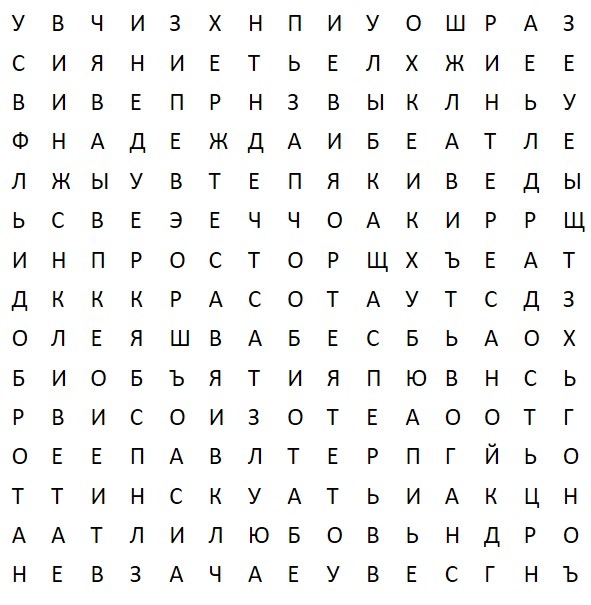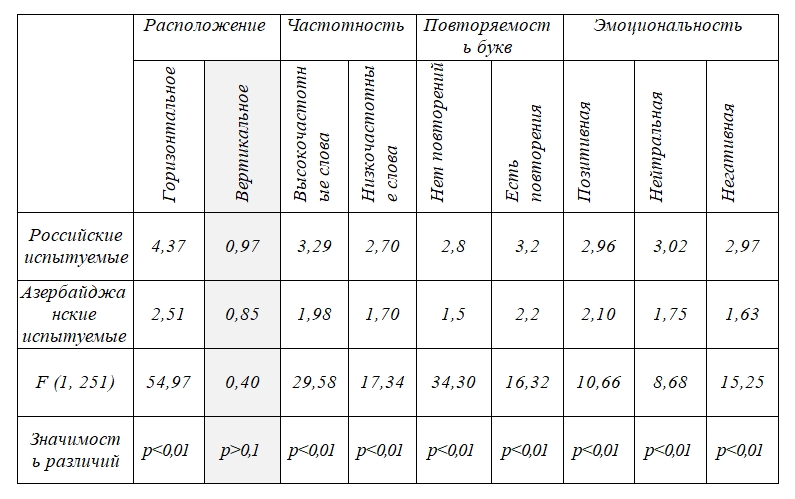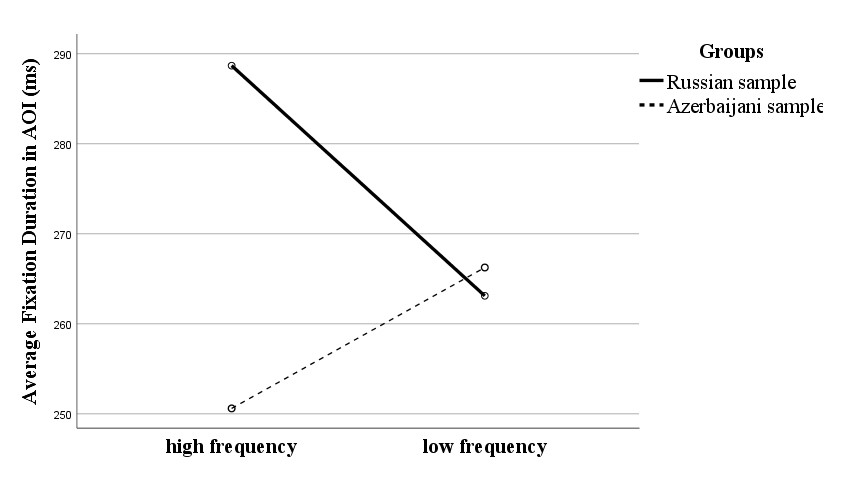The complexity of semantic search in native and foreign languages: an analysis of eye-movements
The article discusses the central problems of word recognition in native and foreign languages. Russian-speaking and Azerbaijani-speaking subjects were solving the visual semantic search task and were looking for Russian words among randomly arranged Cyrillic letters. Words were hidden in the 15x15 letter matrix, they were not spaced, consisted of 6-7 letters, were arranged either horizontally or vertically; half of words included several identical letters, half of them did not. Each matrix had ten words and had an emotional valence index and a frequency index. The recorded indices were the number of found stimuli and eye metrics. The study showed the effects of language knowledge, the arrangement of words in the matrix, their frequency and the letter set. The subjects were more likely to detect horizontally arranged words that have a higher frequency and several identical letters; the established regularity had a similar effect for both groups. The effect of emotional valence was weak only for the Azerbaijani-speaking subjects. The search in the native language was more effective due to the use of more effective strategies for cognitive processing of verbal material. The Russian-speaking subjects employed a consciously controlled strategy, associated with the use of mental resources and reflected in longer fixations and short saccades; the Azerbaijani-speaking subjects used a more chaotic strategy, covering a larger search space, associated with longer saccades and shorter fixations. More complicated tasks (with lower-frequency lexemes) led to a change in strategies and the use of special skills of identifying words, which were different for both groups.
Figures





Blinnikova, I. V., Rabeson, M. D., Blinnikov, G. B. and Izmalkova, A. I. (2023). The complexity of semantic search in native and foreign languages: an analysis of eye movements, Research Result. Theoretical and Applied Linguistics, 9 (1), 64-81. DOI: 10.18413/2313-8912-2023-9-1-0-5


















While nobody left any comments to this publication.
You can be first.
Adelman, J. S. (ed.) (2012). Visual Word Recognition.Volume 2: Meaning and Context, Individuals and Development, Psychology Press, Hove, UK. (In English)
Arestova, O. N. and Muslimzade, P. Z. (2018). Cultural specifics of generalizations at the thinking activity (on the example of Azerbaijani-speaking and Russian-speaking residents of Baku), Voprosy Psikhologii, 3, 87–93. (In Russian)
Balota, D. A. and Spieler, D. H. (1999). Word frequency, repetition, and lexicality effects in word recognition tasks: Beyond measures of central tendency, Journal of Experimental Psychology: General, 128 (1), 32–55. https://doi.org/10.1037/0096-3445.128.1.32(In English)
Blinnikov, G., Rabeson, M. and Blinnikova, I. (2022). Cross-cultural differences in strategies of complex images visual search, Perception, 51 (1), 42. (In English)
Blinnikova, I. and Izmalkova, A. (2016). Eye movement evidence of cognitive strategies in SL vocabulary learning, Smart Innovation, Systems and Technologies, 57, 311–323. https://doi.org/10.1007/978-3-319-39627-9_27(In English)
Blinnikova, I., Blinnikov, G., Bobkov, A. and Alieva, H. (2021). Cross-cultural differences in emotive image assessment: Comparison between Russian and Azerbaijani samples, RSUH/RGGU Bulletin: Psyсhology. Pedagogics. Education, 1, 28–50. DOI: 10.28995/2073-6398-2021-1-28-50 (In Russian)
Blinnikova, I., Marchenko, O. and Badalova, F. (2014) Search for emotionally coloured words in the alphabetic matrix, in Soloviev, V. D., Poliakov, V. N. and Masalova, S. I. (eds.), Cognitive Modeling, Southern Federal University Press, Rostov-on-Don, Russia, 31–36. (In Russian)
Blinnikova, I., Rabeson, M. and Izmalkova, A. (2019). Eye movements and word recognition during visual semantic search: differences between expert and novice language, Psychology in Russia: State of the Art, 12 (1), 129–146. https://doi.org/10.11621/pir.2019.0110(In English)
Craik, F. I., Rose, N. S. and Gopie, N. (2015). Recognition without awareness: Encoding and retrieval factors, Journal of Experimental Psychology: Learning, Memory, and Cognition, 41 (5), 1271-81. DOI: 10.1037/xlm0000137 (In English)
Falikman, M. (2017). Visual search in large letter arrays containing words: Are words implicitly processed during letter search? Journal of Vision, 17 (10), 76-76. https://doi.org/10.1167/17.10.76(In English)
Flusser, J., Kautsky, J. and Šroubek, F. (2007). Object Recognition by Implicit Invariants, in Kropatsch, W. G., Kampel, M. and Hanbury, A. (eds.), Computer Analysis of Images and Patterns: Lecture Notes in Computer Science, 4673, Springer, Berlin, Heidelberg, 856-863. https://doi.org/10.1007/978-3-540-74272-2_106(In English)
Gao, C., Shinkareva, S. V. and Peelen M. V. (2022). Affective valence of words differentially affects visual and auditory word recognition, Journal of Experimental Psychology: General, 151 (9), 2144–2159. https://doi.org/10.1037/xge0001176(In English)
Gough, P. B. (1972). Theoretical models and processes of reading, in Kavanagh, J. F. and Mattingly, I. G. (eds.), Language by Ear and by Eye, MIT Press, Cambridge, MA, USA, 661-685. (In English)
Grainger, J., Dufau, S. and Ziegler, J. C. (2016). A Vision of Reading, Trends in Cognitive Sciences, 20 (3), 171–179. DOI: 10.1016/j.tics.2015.12.008 (In English)
Grigorovich, S., Blinnikova, I. and Izmalkova, A. (2014). Strategies of space scan in the process of visual semantic search, in Soloviev, V. D., Poliakov, V. N. and Masalova, S. I. (eds.), Cognitive Modeling, Southern Federal University Press, Rostov-on-Don, Russia, 49–53. (In English)
Hiebert, E. H. and Pearson, P. D. (2014). Understanding Text Complexity: Introduction to the Special Issue, The Elementary School Journal, 115 (2), 153–160. https://doi.org/10.1086/678446(In English)
Holmqvist, K. and Andersson, R. (2017) Eye tracking: A comprehensive guide to methods, paradigms and measures, Lund Eye-Tracking Research Institute, Lund, Sweden. (In English)
Hyönä, J., Heikkilä, T. T., Vainio, S. and Kliegl, R. (2021). Parafoveal access to word stem during reading: An eye movement study, Cognition, 208, Article 104547. https://doi.org/10.1016/j.cognition.2020.104547(In English)
Kinoshita, S. (2015). Visual word recognition in the Bayesian Reader framework, in Pollatsek, A., Treiman, R. (eds.), Oxford Handbook of Reading, Oxford University Press, Oxford, UK, 63–75. (In English)
Klare, G. R. (1984). Readability, in Pearson, P. D., Barr, R., Kamil, M. and Mosenthal, P. (eds.), Handbook of reading research, Volume 1, Longman, New York, NY, 681–744. (In English)
Kuperman, V., Estes, Z., Brysbaert, M. and Warriner, A. B. (2014). Emotion and language: Valence and arousal affect word recognition, Journal of Experimental Psychology: General, 143 (3), 1065. DOI: 10.1037/a0035669(In English)
Latanov, A. V., Anisimov, V. N. and Chernorizov, A. M. (2016). Eye movement parameters while reading show cognitive processes of structural analysis of written speech, Psychology in Russia: State of the Art, 9 (2), 129-137. DOI: 10.11621/pir.2016.0210 (In English)
Leinenger, M. and Rayner, K. (2017). What we know about skilled, beginning, and older readers from monitoring their eye movements, in León, J. A. and Escudero, I. (eds.), Reading Comprehension in Educational Settings, John Benjamins, Amsterdam, Netherlands, 1–27. DOI: 10.1075/swll.16.01lei(In English)
Martin, R. C., Tan, Y., Newsome, M. R. and Vu, H. (2017). Language and Lexical Processing, Reference Module in Neuroscience and Biobehavioral Psychology, Elsevier, Amsterdam, Netherlands, 631–643. DOI: 10.1016/B978-0-12-809324-5.03078-9 (In English)
McNamara, D. S. (ed.) (2007). Reading Comprehension Strategies: Theories, Interventions, and Technologies, Psychology Press, New York, NY, USA. (In English)
Norris, D. (1984). The Effects of Frequency, Repetition and Stimulus Quality in Visual Word Recognition, Quarterly Journal of Experimental Psychology, 36, 507–518. (In English)
Norris, D. (2013). Models of visual word recognition, Trends in Cognitive Sciences, 17 (10), 517–524. https://doi.org/10.1016/j.tics.2013.08.003(In English)
Norris, D. and Kalm, K. (2021). Chunking and data compression in verbal short-term memory, Cognition, 208, Article 104534. https://doi.org/10.1016/j.cognition.2020.104534(In English)
Rabeson, M. and Blinnikova, I. (2020). Cross-cultural research of strategies and efficiency in visual semantic search, European Proceedings of Social and Behavioural Sciences, 94, 636–645. DOI: 10.15405/epsbs.2020.11.02.78 (In English)
Rastle, K. (2016). Visual Word Recognition, in Hickok, G. and Small, S. L. (eds.), Neurobiology of Language, Academic Press, Amsterdam, Netherlands, 255–264. (In English)
Rayner, K. (1998). Eye movements in reading and information processing: 20 years of research, Psychological bulletin, 124 (3), 372. https://doi.org/10.1037/0033-2909.124.3.372(In English)
Rayner, K. (2009). Eye movements and attention in reading, scene perception, and visual search, The quarterly journal of experimental psychology, 62 (8), 1457–1506. DOI: 10.1080/17470210902816461(In English)
Schad, D. J. and Engbert, R. (2012). The zoom lens of attention: Simulating shuffled versus normal text reading using the SWIFT model, Visual Cognition, 20 (4–5), 391–421. https://doi.org/10.1080/13506285.2012.670143(In English)
Schotter, E. R. and Payne, B. R. (2019). Eye Movements and Comprehension Are Important to Reading, Trends in Cognitive Sciences, 23 (10), 811–812. https://doi.org/10.1016/j.tics.2019.06.005(In English)
Slavova, V. (2022). Language, concept formation and child language acquisition – an information modeling approach, Academic Publishing House of the Bulgarian Academy of Sciences, Sofia, Bulgaria. (In English)
Snell, J. and Grainger, J. (2019). Readers Are Parallel Processors, Trends in Cognitive Sciences, 23 (7), 537–546. https://doi.org/10.1016/j.tics.2019.04.006(In English)
Snow, C. (2002). Reading for Understanding: Toward an R&D Program in Reading Comprehension, RAND Corporation, Santa Monica, CA. (In English)
Solovyev, V., Solnyshkina, M., McNamara, D. (2022). Computational linguistics and discourse complexology: Paradigms and research methods, Russian Journal of Linguistics, 26 (2), 275–316. https://doi.org/10.22363/2687-0088-30161 (In English)
Staub, A., White, S. J., Drieghe, D., Hollway, E. C. and Rayner, K. (2010). Distributional effects of word frequency on eye fixation durations, Journal of Experimental Psychology: Human Perception and Performance, 36 (5), 1280–1293. https://doi.org/10.1037/a0016896(In English)
Toyama, Y., Hiebert, E. H. and Pearson, P. D. (2017). An Analysis of the Text Complexity of Leveled Passages in Four Popular Classroom Reading Assessments, Educational Assessment, 22, 139–170. https://doi.org/10.1080/10627197.2017.1344091(In English)
Velichkovsky, B. M., Challis, B. H. and Pomplun, M. (1995). Arbeitsgedächtnis und Arbeit mit dem Gedächtnis: Visuell-räumliche und weitere Komponenten der Verarbeitung [Working memory and work with memory: Visuospatial and further components of processing], Zeitschrift für Experimentelle Psychologie, 42 (4), 672–701. (In German)
Velichkovsky, B. M., Joos, M., Helmert, J. R. and Pannasch, S. (2005). Two visual systems and their eye movements: Evidence from static and dynamic scene perception, Proceedings of the XXVII conference of the cognitive science society, 2283–2288. (In English)
Yap, M. J. and Balota, D. A. (2015). Visual word recognition, in Pollatsek, A. and Treiman, R. (eds.), The Oxford handbook of reading, Oxford University Press, Oxford, UK, 26–43. (In English)
Zelinsky, G. J. (2008). A theory of eye movements during target acquisition, Psychological Review, 115, 787–835. DOI: 10.1037/a0013118 (In English)